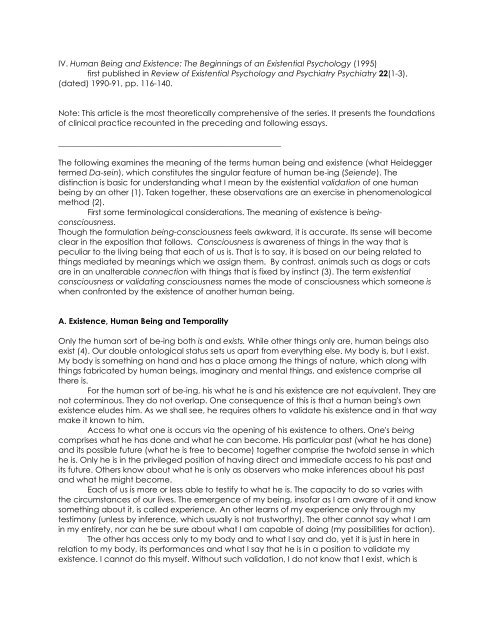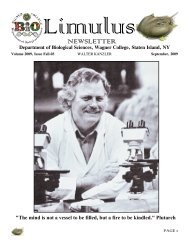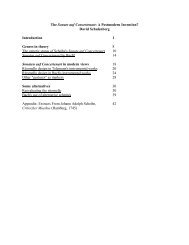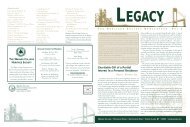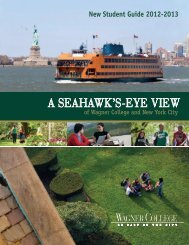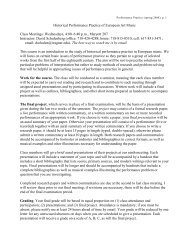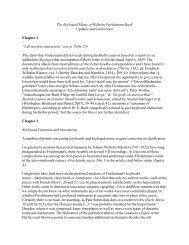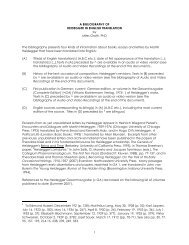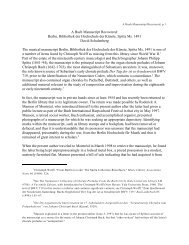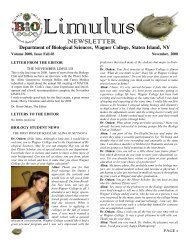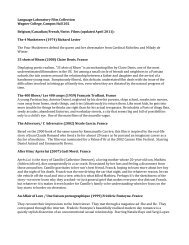SEVEN PAPERS ON EXISTENTIAL ANALYSIS ... - Wagner College
SEVEN PAPERS ON EXISTENTIAL ANALYSIS ... - Wagner College
SEVEN PAPERS ON EXISTENTIAL ANALYSIS ... - Wagner College
You also want an ePaper? Increase the reach of your titles
YUMPU automatically turns print PDFs into web optimized ePapers that Google loves.
IV. Human Being and Existence: The Beginnings of an Existential Psychology (1995)<br />
first published in Review of Existential Psychology and Psychiatry Psychiatry 22(1-3),<br />
(dated) 1990-91, pp. 116-140.<br />
Note: This article is the most theoretically comprehensive of the series. It presents the foundations<br />
of clinical practice recounted in the preceding and following essays.<br />
_______________________________________________________<br />
The following examines the meaning of the terms human being and existence (what Heidegger<br />
termed Da-sein), which constitutes the singular feature of human be-ing (Seiende). The<br />
distinction is basic for understanding what I mean by the existential validation of one human<br />
being by an other (1). Taken together, these observations are an exercise in phenomenological<br />
method (2).<br />
First some terminological considerations. The meaning of existence is beingconsciousness.<br />
Though the formulation being-consciousness feels awkward, it is accurate. Its sense will become<br />
clear in the exposition that follows. Consciousness is awareness of things in the way that is<br />
peculiar to the living being that each of us is. That is to say, it is based on our being related to<br />
things mediated by meanings which we assign them. By contrast, animals such as dogs or cats<br />
are in an unalterable connection with things that is fixed by instinct (3). The term existential<br />
consciousness or validating consciousness names the mode of consciousness which someone is<br />
when confronted by the existence of another human being.<br />
A. Existence, Human Being and Temporality<br />
Only the human sort of be-ing both is and exists. While other things only are, human beings also<br />
exist (4). Our double ontological status sets us apart from everything else. My body is, but I exist.<br />
My body is something on hand and has a place among the things of nature, which along with<br />
things fabricated by human beings, imaginary and mental things, and existence comprise all<br />
there is.<br />
For the human sort of be-ing, his what he is and his existence are not equivalent. They are<br />
not coterminous. They do not overlap. One consequence of this is that a human being's own<br />
existence eludes him. As we shall see, he requires others to validate his existence and in that way<br />
make it known to him.<br />
Access to what one is occurs via the opening of his existence to others. One's being<br />
comprises what he has done and what he can become. His particular past (what he has done)<br />
and its possible future (what he is free to become) together comprise the twofold sense in which<br />
he is. Only he is in the privileged position of having direct and immediate access to his past and<br />
its future. Others know about what he is only as observers who make inferences about his past<br />
and what he might become.<br />
Each of us is more or less able to testify to what he is. The capacity to do so varies with<br />
the circumstances of our lives. The emergence of my being, insofar as I am aware of it and know<br />
something about it, is called experience. An other learns of my experience only through my<br />
testimony (unless by inference, which usually is not trustworthy). The other cannot say what I am<br />
in my entirety, nor can he be sure about what I am capable of doing (my possibilities for action).<br />
The other has access only to my body and to what I say and do, yet it is just in here in<br />
relation to my body, its performances and what I say that he is in a position to validate my<br />
existence. I cannot do this myself. Without such validation, I do not know that I exist, which is


